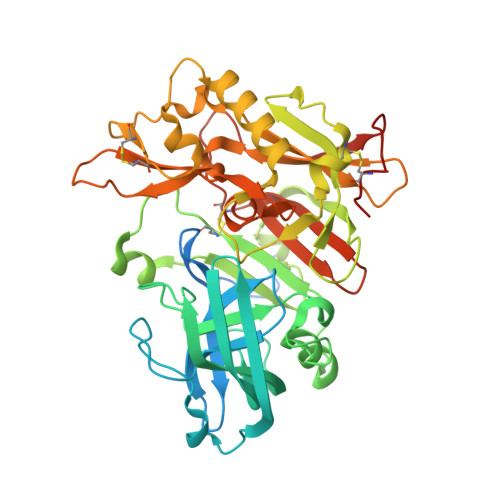The Potent BACE1 Inhibitor LY2886721 Elicits Robust Central A beta Pharmacodynamic Responses in Mice, Dogs, and Humans.
May, P.C., Willis, B.A., Lowe, S.L., Dean, R.A., Monk, S.A., Cocke, P.J., Audia, J.E., Boggs, L.N., Borders, A.R., Brier, R.A., Calligaro, D.O., Day, T.A., Ereshefsky, L., Erickson, J.A., Gevorkyan, H., Gonzales, C.R., James, D.E., Jhee, S.S., Komjathy, S.F., Li, L., Lindstrom, T.D., Mathes, B.M., Martenyi, F., Sheehan, S.M., Stout, S.L., Timm, D.E., Vaught, G.M., Watson, B.M., Winneroski, L.L., Yang, Z., Mergott, D.J.(2015) J Neurosci 35: 1199-1210
- PubMed: 25609634
- DOI: https://doi.org/10.1523/JNEUROSCI.4129-14.2015
- Primary Citation of Related Structures:
4X7I - PubMed Abstract:
BACE1 is a key protease controlling the formation of amyloid β, a peptide hypothesized to play a significant role in the pathogenesis of Alzheimer's disease (AD). Therefore, the development of potent and selective inhibitors of BACE1 has been a focus of many drug discovery efforts in academia and industry. Herein, we report the nonclinical and early clinical development of LY2886721, a BACE1 active site inhibitor that reached phase 2 clinical trials in AD. LY2886721 has high selectivity against key off-target proteases, which efficiently translates in vitro activity into robust in vivo amyloid β lowering in nonclinical animal models. Similar potent and persistent amyloid β lowering was observed in plasma and lumbar CSF when single and multiple doses of LY2886721 were administered to healthy human subjects. Collectively, these data add support for BACE1 inhibition as an effective means of amyloid lowering and as an attractive target for potential disease modification therapy in AD.
- Lilly Research Laboratories, Eli Lilly and Company, Indianapolis, Indiana 46285.
Organizational Affiliation:


















